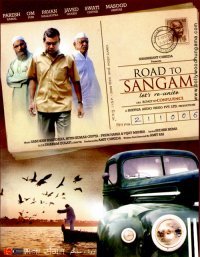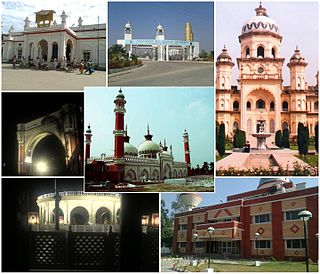
Rampur is a town and the municipality headquarter of Rampur District in the Indian state of Uttar Pradesh. It was formerly known for its various industries, like sugar refining and cotton milling. Its library has more than 12,000 rare manuscripts and a fine collection of Mughal miniature paintings. It is located 322 kilometres north-west of the state capital Lucknow & approx 180 kilometres from the national capital New Delhi.

Rishi Kapoor was an Indian actor, film director, and producer who worked in Hindi films. Kapoor was the recipient of several accolades, including a National Film Award and four Filmfare Awards, in a career that spanned 50 years and regarded as one of the most successful and sensational actor in Hindi cinema.
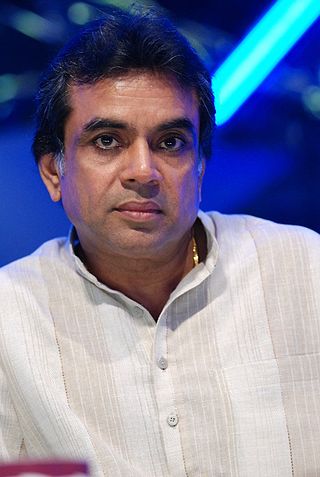
Paresh Rawal is an Indian actor, comedian, film producer and politician known for his works primarily in Hindi films. He has appeared in over 240 films and is the recipient of various accolades. In 1994, he won the National Film Award for Best Supporting Actor for his performances in the films Woh Chokri and Sir. For the latter, he received his first Filmfare Award for Best Performance in a Negative Role. This was followed by Ketan Mehta's Sardar, which saw him playing the lead role of freedom fighter Vallabhbhai Patel, a role that got him national and international acclaim. He was honoured with Padma Shri from the Government of India in 2014.
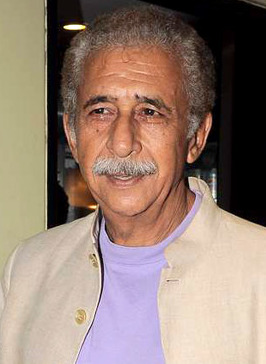
Naseeruddin Shah is an Indian actor. He was notable in Indian parallel cinema and has starred in various international productions. He has won numerous awards in his career, including three National Film Awards, three Filmfare Awards and the Volpi Cup for Best Actor at the Venice Film Festival. The Government of India honoured him with the Padma Shri and the Padma Bhushan awards for his contributions to Indian cinema.

Allahabad Fort was built by the Mughal emperor Akbar at Prayagraj in 1583. The fort stands on the banks of the Yamuna, near its confluence with the Ganges. It is classified by the Archaeological Survey of India as a monument of national importance.

Abhijeet Bhattacharya, professionally known as Abhijeet, is an Indian playback singer who primarily sings in the Hindi film industry. As well as Hindi, he has sung in his native language Bengali and in other languages including Marathi, Nepali, Tamil, Bhojpuri, Punjabi, and Odia, in both West Bengal and Bangladesh. He has sung 6034 songs in more than 1000 films.

Sardar is a 1993 Indian biographical drama film on Sardar Vallabhbhai Patel, one of India's greatest freedom fighters, directed by Ketan Mehta and written by noted playwright Vijay Tendulkar and Hriday Lani. The film was screened retrospective on 12 August 2016 at the Independence Day Film Festival jointly presented by the Indian Directorate of Film Festivals and Ministry of Defence, commemorating 70th Indian Independence Day.
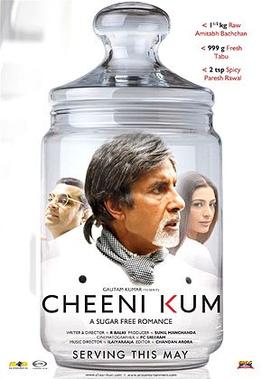
Cheeni Kum is a 2007 Indian Hindi-language romantic comedy film directed by R. Balki and starring Amitabh Bachchan, Tabu, Paresh Rawal, Zohra Sehgal, and Swini Khara.
Paresh Maity is an Indian painter. He is a prolific painter in a short career span. In 2014, Government of India conferred upon him its fourth-highest civilian award the Padma Shri.
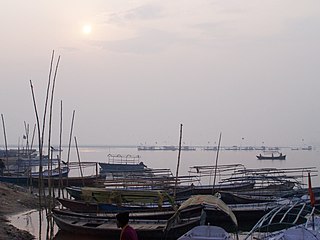
In Hindu tradition, Triveni Sangam is the confluence of three rivers that is also a sacred place, with a bath here said to flush away all of one's sins and free one from the cycle of rebirth.

Prayagraj, formerly Allahabad, is a metropolis in the Indian state of Uttar Pradesh. It is the administrative headquarters of the Prayagraj district, the most populous district in the state and 13th most populous district in India and the Prayagraj division. The city is the judicial capital of Uttar Pradesh with the Allahabad High Court being the highest judicial body in the state. As of 2011, Prayagraj is the seventh most populous city in the state, thirteenth in Northern India and thirty-sixth in India, with an estimated population of 1.53 million in the city. In 2011, it was ranked the world's 40th fastest-growing city. The city, in 2016, was also ranked the third most liveable urban agglomeration in the state and sixteenth in the country. Hindi is the most widely spoken language in the city.

Aditya Srivastava is an Indian actor who works in Hindi films, television and theatre. He is best known for his role as Senior Inspector Abhijeet in India's longest-running television police procedural C.I.D.. He has also portrayed pivotal roles in the Bollywood films Satya, Gulaal, Lakshya, Paanch, Black Friday, Kaalo, Super 30 and Dil Se Pooch Kidhar Jana Hai.
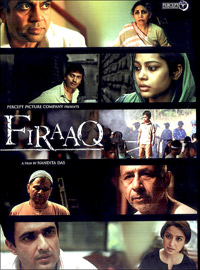
Firaaq is a 2008 Indian Hindi-language drama film written and directed by Nandita Das. It is set one month after the 2002 violence in Gujarat, India, and looks at the aftermath and its effects on the lives of everyday people. It claims to be based on "a thousand true stories." Firaaq means both separation and quest in Arabic. The film is the directorial debut of actress Nandita Das and stars Naseeruddin Shah, Deepti Naval, Nawazuddin Siddiqui, Inaamulhaq, Nassar, Paresh Rawal, Sanjay Suri, Raghubir Yadav, Shahana Goswami, Amruta Subhash, and Tisca Chopra.

Gauhar Raza is an Indian scientist by profession, and a leading Urdu poet, social activist and documentary filmmaker working to popularize the understanding of science among general public, known for his films like Jung-e-Azadi, on the India's First War of Independence, and Inqilab (2008) on Bhagat Singh. He was also the honorary director of Jahangirabad Media Institute.
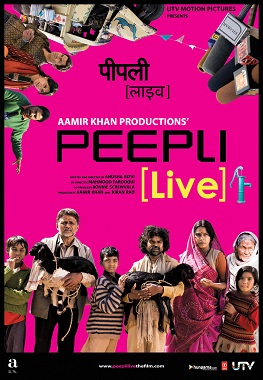
Peepli Live is a 2010 Indian satirical black comedy film that explores the topic of farmer suicides and the subsequent media and political response. It is written and directed by Anusha Rizvi in her directorial debut, and produced by Aamir Khan Productions. The film stars Naya Theatre company member Omkar Das Manikpuri as well as Naseeruddin Shah, Raghubir Yadav, Nawazuddin Siddiqui, Shalini Vatsa and Malaika Shenoy along with a number of newcomers. Peepli Live, distributed by UTV Motion Pictures, was released on 13 August 2010.
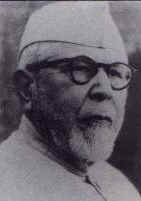
Abdul Majeed Khwaja was an Indian lawyer, educationist, social reformer and freedom fighter from Aligarh. In 1920, he along with others founded Jamia Millia Islamia and later served its vice chancellor and chancellor.

The Allahabad Museum is a national-level museum in Prayagraj, Uttar Pradesh.
